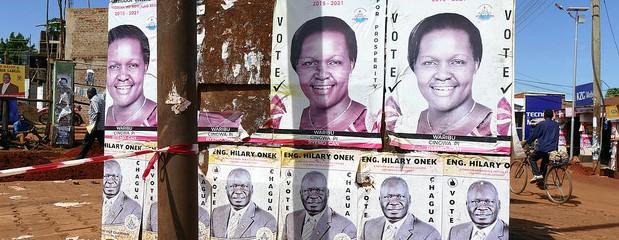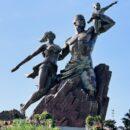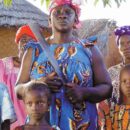Darfur: Could a Woman be Sultan?
The AU Panel has spent between six and ten hours each day, for the last week, in meetings with large delegations from Darfurian civil society, native administration, IDPs and pastoralists, as well as national political parties. Today, at a hearing with civil society groups in el Geneina, Justice Florence Mumba asked, “Why are there no women in the native administration in Darfur?” She pointed out that female chiefs are not uncommon in other parts of Africa, including her native Zambia, but the Panel had yet to encounter one in Darfur. (In fact, there was a woman sitting with the native administration delegation in al Fashir on Saturday, but she did not speak.)
The question caused uproar. Nearly half of the civil society delegates were women and they applauded the question. But a male omda was the first to speak. He explained how village sheikhs are chosen by the men of the village, and every six to eight sheikhs elects and omda, and every six to eight omdas chooses a fursha or amir, who in turn affirms the position of the Sultan. All are men and he clearly could not conceive of an alternative arrangement. “We cherish and protect our women” he said.
President Mbeki then asked for a woman to respond. Half a dozen volunteered. Hawa Hassan Mansour was first in line. She contested the omda’s version. “There is a female sheikha who is also elected,” she said, “and by the way she gives birth to the male sheikh.” Hawa explained how the female sheikha has responsibilities and duties. She works on bringing conflict to an end, tending the wounded, and calming people. “We also have our equivalents of omda and amir,” she continued. “Anyway, what’s wrong with having a female omda?”
A second lady, Khaltoum Nimairi, took the floor. “Do we have experience in this field? Yes!” She gave examples of women who had taken part in consultative councils, which she said, “provided solid and convincing arguments.” One case was Taja, the sister of the last Fur Sultan Ali Dinar, who was in his council. The same was true in the Sultanate of Dar Gimir. Women serve in the assemblies of localities, states and the National Assembly. As we are the majority of the population today, Khaltoum said, we will elect our sisters. “If we want a female omda, why not? If we want a female sultan, we shall get one.”

President Mbeki closed the discussion by agreeing with Khaltoum, “why should not my mother, the woman who gave birth to me, also not be eligible to be an omda or a sultan?”









I can not resist pointing out that under the old sultans of Darfur, the senior sister of the reigning sultan, who had the title iiya baasi, had a great deal of power as did the senior wife, the iiya kuuri. When Sultan Muhammad al-Husayn (reigned 1838-73) went blind in about 1850, his sister and iiya baasi, Zamzam Umm al-Nasr, basically ran the state, riding around astride a horse. I photographed in Mellit a number of legal documents from the 1860s, where the judge was hearing a case “on behalf of” (bi-niyaba) the iiya baasi Zamzam. In other words, there are good precedents for female chiefs
The codification of “customary” law under the British, especially after the various ordnances extending legal powers to the Native Administration, was among other things an exercise in the extension of de facto legislative authority to an exclusively male cadre of chiefs, identified as the custodians of “custom”. Alternative traditions such as matrilineality and the existence and powers of female chiefs vanished from the official record in the process. The Native Administration needs reinvention both in its relationship with governmental authority and its gender dimension.
aralen hcl hydroxychloroquine warnings hydroxicloriquin